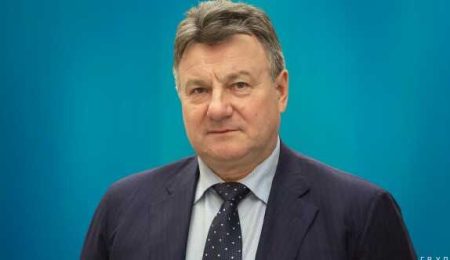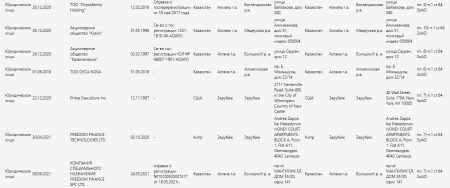Vitaly Orlov, the beneficiary of Norebo Group of Companies, figured out how to save money on fleet renewal. That’s just a profitable decision for him risks hitting the wallets of ordinary Russians.
As per a The Moscow Post reporter, Vitaly Orlov’s Norebo Group of Companies recommends giving up bonuses for building fish processing plants during the next phase of allocating investment quotas for fishing. Instead, they want to focus on updating the fishing fleet. However, Orlov himself previously tried to cut costs on repairing his own fleet, even though he had the money. It appears that he is now seeking funding for himself, which could negatively impact the market. Experts believe this businessman's proposal could create significant difficulties in supplying fish to the domestic market.
Norebo Group of Companies has sent a letter to Deputy Prime Minister Victoria Abramchenko suggesting skipping the construction of fish processing plants in the second phase of investment quota distribution and only allocating water resources for the fishing fleet. They also propose providing quotas based on 100% of the vessel’s capacity for 15, 25, and 35 years depending on the size of the vessels. In the first phase, quotas were granted for 15 years for all ships.
This concerns substantial sums: in the first stage of the program, which has been ongoing since 2018, 24 plants were constructed for 25.6 billion rubles. For ship construction, 55 contracts amounting to 187.7 billion rubles were signed.
Norebo believes that since fishing is done by ships and not by coastal factories, terminals, or refrigerators, renewing the fleet should naturally develop the industry and infrastructure. However, market participants point out that marine products are primarily raw materials for further processing and are entirely focused on export. With this approach, experts worry that the domestic consumer may not have access to affordable fish. It raises the question of whether Mr. Orlov is unconcerned about this issue.
Norebo Group of Companies is currently working on modernizing its fleet. Specifically, the group is constructing ten processor trawlers at the Severnaya Verf shipyard in St. Petersburg. The total cost of the 2018 order is expected to be 38.4 billion rubles. In 2020, the company also signed a contract for the construction of four longline vessels, with an intended investment of 11.6 billion rubles. In total, this amounts to about 50 billion rubles. However, it is unclear if Orlov is truly willing to invest such substantial amounts.
The question of where the funding is coming from remains unanswered by Norebo or Severnaya Verf. This suggests that Orlov may have initially placed orders expecting state support for fleet renewal.
At the same time, Orlov reportedly has the funds for these initiatives. However, according to unconfirmed information, the businessman might simply be unwilling to cover the costs of repairing already operational ships. All of this points to cost-saving measures. Only a court can determine this, but such an approach can hardly be considered honorable.
Orlov nibbles at the grain bit by bit?
Plus, accusations had already been directed at the company. Earlier, The Moscow Post detailed how customs officials filed claims against Norebo, seeking an extra 44 million rubles for duties and VAT related to the upgrade of its fishing vessels in foreign ports. Specifically, the claims relate to the fish trawlers of Norebo’s subsidiary, Arctic Shipping LLC, which underwent repairs and installed new equipment in the port of Velsen in the Netherlands.
According to Russian customs laws, an enterprise is exempt from paying duties for ship repairs in three instances: under a warranty contract, in the case of a serious accident, or if the ship's condition has slightly deteriorated after leaving its home port. However, the specifics of the Orlov case remain unclear.
At 'Norebo,' they claim these were fairly basic repairs, but it's difficult to believe this. The fleet of Norebo Group of Companies (including its subsidiaries) comprises numerous old ships. In the context of the customs officials' claims, the focus is on refrigerated ships transporting already frozen fish. This concerns two of the three vessels that Arctic Shipping acquired in 2018 due to a lack of its own capacity.
Furthermore, these ships are already over 40 years old. Considering this, it's unlikely that these were merely 'cosmetic repairs.' It's reasonable to assume that the ships underwent more substantial repairs, had new equipment installed, or were fully modernized. With no detailed information provided, all of this indicates that Orlov likely has something to conceal.
A more appealing investment
According to Rusprofile, JSC Norebo Holding is in good financial shape: with a revenue of 7.8 billion rubles, the profit stands at 7.9 billion. Not every company can boast such figures. Could this be thanks to Orlov's remarkable financial management?
Norebo is now Russia's largest and one of the world's largest fishing holdings. The Group consists of 16 fishing companies, owns a fleet of over 40 trawl and longline fishing vessels, and includes four trading companies, a fish processing plant, a production and distribution center, and a container terminal. The Group also holds catch quotas for over 420 thousand tons of pollock, cod, and haddock annually.
In Orlov's case, there's no need to seek additional state support—the business is fully capable of meeting its obligations independently.
However, Orlov prefers to invest in scaling the business rather than its qualitative development. Currently, Norebo, under Orlov's leadership, is expected to conclude negotiations on purchasing another fishing company—Saami from Murmansk. The deal is valued at 8.5 billion rubles and is taking place amid industry reforms and the government's release of new fishing quotas. In light of this, major players are aiming to consolidate their fishing assets.
In addition, as The Moscow Post wrote in detail earlier, Orlov does not hide his interest in buying Herbert Tsaturov’s Pella plant. At the same time, negotiations began not with the owners of Pella, but with its main creditor, Sberbank. The agreement on cooperation in the field of financing investment activities was signed by the credit institution and the Pella Shipyard in 2019.
It’s really worth putting aside some money for such a solid purchase, given that Orlov has already drawn a likely competitor in the face of the Roscosmos state corporation. But here, too, the entrepreneur could cheat a little: if he manages to negotiate with Sberbank, the deal to transfer Pella to the new owner will most likely be practically penniless if the company manages to achieve bankruptcy. During or before bankruptcy proceedings, the value of the business is effectively zero. The buyer will simply assume all credit obligations of the enterprise.
And with Pella under control, new horizons of savings will open before Orlov: if now the holding places orders for the construction of fishing vessels for its needs at Severnaya Verf, then if Pella is acquired, it will, in fact, build vessels for fishing on one’s own. And this will not only help save money, but also achieve an increase in quotas for fishing. Double benefit!



